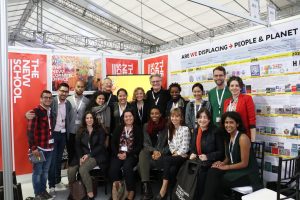The New School has sent a delegation of students and faculty to participate at Habitat III – the United Nations Conference on Housing and Sustainable Urban Development in Quito, Ecuador from October 17 to 20, 2016. This conference is the 3rd conference organized by the UN on this subject, the last one being in June 1996 at Istanbul.

The New School will man a large booth where students and faculty will present more than 20 hours of work over four days, including proposing “A New Urban Agenda requires a New Urban Practice.” This new agenda calls for a much more integrated approach by countries and cities in addressing urban problems such as urban poverty, inequality, poor housing, environmental deterioration, weak governance, and infrastructural shortages across jurisdictional and administrative boundaries. Twelve of the Seventeen Sustainable Development Goals adopted by the UN in September 2015 will need to be implemented in cities for this goal to be achieved.
In addition to contributing to the main conference, The New School students and Faculty will present work and exhibit publications in some of the parallel conferences, including Hacia Un Habitat 3 Alternativo (Toward an Alternative Habitat 3) – a four day conference of urban academics and practitioners, organized by FLACSO, the Latin American Faculty on Social Sciences. “The FLACSO seminar is the brainchild of former Quito mayor Augusto Barrera, who conceived the idea to host Habitat III in Quito,” writes Gregory Scruggs for Cityscope, who quoted Barrera as saying,
“We are articulating a network of universities that are working to construct an urban academic agenda, something which has basically never been done before. On the one hand, the legacy [of Habitat III] is the declaration, without a doubt. But on the other hand, the second is just as important as the first, and that’s the construction of a large global network.”
In addition, The New School delegation will also host an official side event of the Habitat III conference entitled “Inclusive Urban Practice Beyond Habitat III” where they will present the findings of the Habitat Commitment Project – a study that assessed the fulfillment of commitments made by governments at the Habitat II conference in 1996. Part of this analysis included the findings of the Habitat Commitment Index (HCI), created by The Global Urban Futures project (GUFP) at The New School in response to the Habitat II. The HCI assesses the extent of national performance on 15 indicators, weighted by the GDP of each country allowing an assessment of the effort made by individual countries. The results show that more than half of the 169 countries included in the study made little or no progress towards urban well being over the past two decades.
The GUFP describes itself as “a learning network of scholars and activists who are changing the conversation about urban policy in respoonse to the need for evaluation of the fulfillment of commitments made by governments at the 1996 Habitat II Conference.”

The New School delegation includes students from 12 countries: Botswana, Canada, Colombia, El Salvador, Germany, Israel, Kenya, Korea, Lebanon, Mexico, Philippines, and the United States. Faculty come from Argentina, India, Mexico, Serbia, and the United States. Students and faculty represent multiple schools across the University, including the Milano School of International Affairs, Management, and Urban Policy and the Parsons School for Design.
For updates on the work of The New School delegation at Habitat III, follow @GUFPMilano or @NewSchool_IA on Twitter or discover the GUFP Habitat III agenda here.




